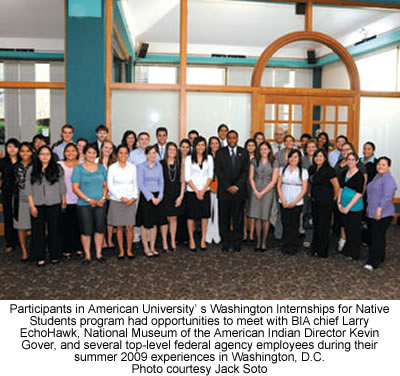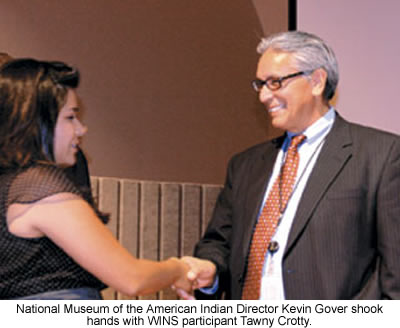 |
Canku Ota
|
 |
|
(Many Paths)
|
||
|
An Online Newsletter
Celebrating Native America
|
||
|
December 1, 2009 - Volume
7 Number 12
|
||
|
|
||
|
Education Inside
The Beltway
|
||
|
by Rob Capriccioso for
Indian Country Today
|
||
|
Indian
students learn policy prowess in nation’s capital
LaMere is one of a growing number of American Indian students who are getting educated in the ways of American government through first-hand experience in the nation’s capital. Anecdotal evidence suggests Native student participation in programs focused on public policy, government and other fields is at an all-time high in Washington, D.C. And tribes and families seem increasingly supportive. “I am so very proud of her,” said Lexie’s father, Frank LaMere, longtime chairman of the Native American Caucus of the DNC. “Our Native students really get a lot out of learning from inside the Beltway, and, importantly, they are showing people in government that there is a strong, new generation of Indian leaders coming down the pipeline.” Lexie’s page experience allowed her to interact with several political bigwigs, including Senate Majority Leader Harry Reid, D-Nev., on a regular basis. She also got to see how policy is crafted, as well as the complicated give-and-take process of the legislative branch. Much of her experience was spent aiding senators and representatives, delivering correspondence materials and trekking around chambers with bills and amendments. She also regularly attended rigorous classes at the U.S. Senate Page School. Lexie’s experience won’t guarantee a path to success, but she is in good company. Notable former Senate pages include Microsoft founder Bill Gates and money man Warren Buffett. Kalyn Free, founder and president of the Indigenous Democratic Network political action organization, otherwise known as INDN’s List, said it is exciting to see a new generation of Native students learning about policymaking from the frontlines. She said Indian involvement in programs like this is needed – not only to get Indian faces involved in American government and politics, but also to bring knowledge back to their home tribes. Free feels some tribal folks think students shouldn’t go to Washington to learn, as there is a perception they will become “Beltway beasts” who will never want to return to the reservation. But Free, a member of the Choctaw Nation of Oklahoma, said that stereotype isn’t true, and she is glad to say she thinks it’s an attitude that is fading on reservations. In her case, Free once worked at the Department of Justice in D.C., overseeing many important tribal justice issues, but she has since returned home to work on tribal issues. “Washington offers a great learning experience for our students. It won’t be for everyone, but the hands-on experience is incredible. You become prepared for so many challenges in all aspects of your life.” She
said her time in D.C. allowed her to give advice and mentor future
Indian leaders, including Hilary Tompkins, Navajo, who recently
became the first Indian solicitor at the Department of the Interior
and Kim Teehee, Cherokee, who is a Native affairs adviser to President
Obama in the White House.
Jack Soto, director of American University’s Washington Internships for Native Students program, agrees that tribes can offer important work experiences to Native students. He noted that some tribes, including the Cherokee Nation, are getting students involved working in their Washington offices during the summer. This summer, Soto, of Navajo and Cocopah descent, oversaw a select group of Native students who took part in the WINS program. The opportunity gave them the chance to work in various government agencies and take classes for college credit on American Indian issues – all for free – while earning a stipend. “The knowledge and understanding of policy and the implementation of it is something we are really fortunate to be able to offer students. It changes the way they think about their career choices and where they want to go in life.” Soto said students who take advantage of opportunities in D.C. are not necessarily all looking for a career in politics. “Many of them are trying to figure out how they can assist the next generation and trying to figure out where their own skill sets will play into their decisions.” At the end of the WINS summer offerings in late July, the program featured an appearance by Larry EchoHawk, the Pawnee director of the BIA, and by Kevin Gover, the Pawnee head of the National Museum of the American Indian. Students are already lined up to participate into the fall and next summer. Soto is hopeful that more tribal leaders think about creating WINS-like programs in their areas across the nation to get an experiential sense of policymaking and community building. “Experiences like WINS, the page program and others really give these students the opportunity to get face time with important players,” Free said. “And through those connections, they might be able to make good things happen for their tribes and for all Indian people one day.” While programs for Native students seem to be increasingly popular in D.C., Mellor Willie, director of the Native American Indian Housing Council and member of an advisory group for the Udall Native American Congressional Internships program, said there needs to be more opportunities. An alum of the Udall program himself, Willie, a member of the Navajo Nation, said the program gave him the confidence to live and learn in a city like Washington, and was part of the pathway to his job leading the housing council. Willie said the Washington Center academic organization has established an internship program for Native students. “There are a lot of great programs here for students who wish to take advantage of them, but it seems like there needs to be more, since I always hear how popular they are.” Willie feels there needs to be encouragement from tribal leaders on reservations to make sure all types of students are aware of such opportunities to expand their horizons. “It’s important to get a good mix of students participating – some who will bring their knowledge back, and some who will perhaps stay and work on behalf of tribes from Washington.” For the students who have taken advantage of D.C.-based programs, the future looks bright. Today, Lexie is home, preparing herself for another soon-to-come graduation – this time from Bishop Heelan High School in Sioux City, Iowa. Her dad thinks she may have a career in politics or public policy one day. |
|
|
||
|
|
||
| Canku Ota is a free Newsletter celebrating Native America, its traditions and accomplishments . We do not provide subscriber or visitor names to anyone. Some articles presented in Canku Ota may contain copyright material. We have received appropriate permissions for republishing any articles. Material appearing here is distributed without profit or monetary gain to those who have expressed an interest. This is in accordance with Title 17 U.S.C. Section 107. | ||
|
Canku Ota is a copyright ©
2000, 2001, 2002, 2003, 2004, 2005, 2006, 2007, 2008, 2009 of Vicki
Barry and Paul Barry.
|
||
 |
 |
|
|
The "Canku
Ota - A Newsletter Celebrating Native America" web site and
its design is the
|
||
|
Copyright ©
1999, 2000, 2001, 2002, 2003, 2004, 2005,
2006, 2007, 2008, 2009 of Paul
C. Barry.
|
||
|
All Rights Reserved.
|
||
 Lexie
LaMere, a teenage member of the Winnebago Tribe of Nebraska, was
at the Democratic National Convention in Denver last summer, passing
out campaign literature and buttons. Then, she eagerly watched President
Barack Obama’s inauguration in January. And later that month,
she became one of the few Native Americans to graduate from the
Senate Page Program.
Lexie
LaMere, a teenage member of the Winnebago Tribe of Nebraska, was
at the Democratic National Convention in Denver last summer, passing
out campaign literature and buttons. Then, she eagerly watched President
Barack Obama’s inauguration in January. And later that month,
she became one of the few Native Americans to graduate from the
Senate Page Program.  Free
said there is no reason internships and other experiences that are
offered to Native students by various Washington government agencies
and organizations could not be offered by tribes. Her organization,
INDN’s List, based in Tulsa, Okla., is beginning to see more
college student participation.
Free
said there is no reason internships and other experiences that are
offered to Native students by various Washington government agencies
and organizations could not be offered by tribes. Her organization,
INDN’s List, based in Tulsa, Okla., is beginning to see more
college student participation.